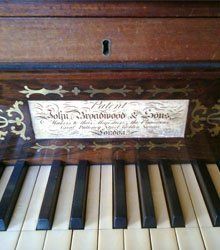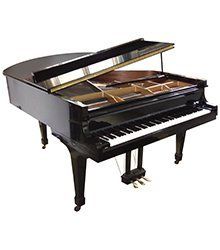Your trusted piano specialists in Gloucester and Newcastle Upon Tyne
Don't let your piano go out of tune. Get it serviced regularly by our experts. G. A. Stone offers professional piano tuning and maintenance services in Gloucester. Contact us
today.
Piano FAQs
Tuning
Firstly, use makes a piano go out of tune. The vibrations that travel through the instrument when it is played because the tuning pins to rotate in their sockets, with the result that the tension of the strings alters and the strings are no longer vibrating at the required frequencies.
Secondly, fluctuating temperatures and humidity levels in the air cause the wood and the metals in the instrument to expand and contract. This also causes alterations in the tension of the strings, and similarly therefore, the tuning changes.
The frequency with which a piano needs to be tuned will vary depending on the amount of use it is getting, the environment in which it is situated, and the condition of the instrument. In general however, to keep the tuning stable, a good rule of thumb is to get it done twice a year – once when the heating is on and once when the heating is off.
Maintenance
What kind of maintenance does a piano need?
Prompt attention to faults is advisable. Delay in dealing with a problem may result in the parts concerned becoming more seriously damaged, in which case the repair will be more involved and the cost may be greater.
Aim to keep the regulation of the piano in good order. Getting it regulated periodically restores the correct timing of the moving parts, which not only reduces the effects of wear and tear on the leathers and baizes etc. but is also essential for good playing and effective piano practice.
As a piano ages, the leathers, baizes and felts wear out and the springs begin to fatigue, making it impossible to regulate the piano reliably. Also the tuning pins loosen, and the strings lose their flexibility and may break during tuning. When these things begin to happen, if you are not considering replacing the piano, then re-conditioning will become necessary to restore the correct functioning of the piano
Environment
What kind of environment do they need?
A room that is very warm, or where there are marked fluctuations between warm and cold, will tend to dry out the wood of the piano and accelerate splitting and cracking. To avoid this aim wherever possible to maintain a fairly even temperature that is not too warm.
Moderate humidity levels are also best. If the air is too dry it will dry out the wood even if the temperature is cool. On the other hand, damp triggers rust and mould. Where it is possible to achieve it, an ideal humidity would be between 60% - 70% relative humidity.

Don't let your piano go out of tune. Call the experts at G. A. Stone for piano tuning and maintenance services in Gloucester.
01452 690 819


